Camping for Ducks
When it’s time for the rubber to meet the road, you can take your hunting camp with you
When it’s time for the rubber to meet the road, you can take your hunting camp with you
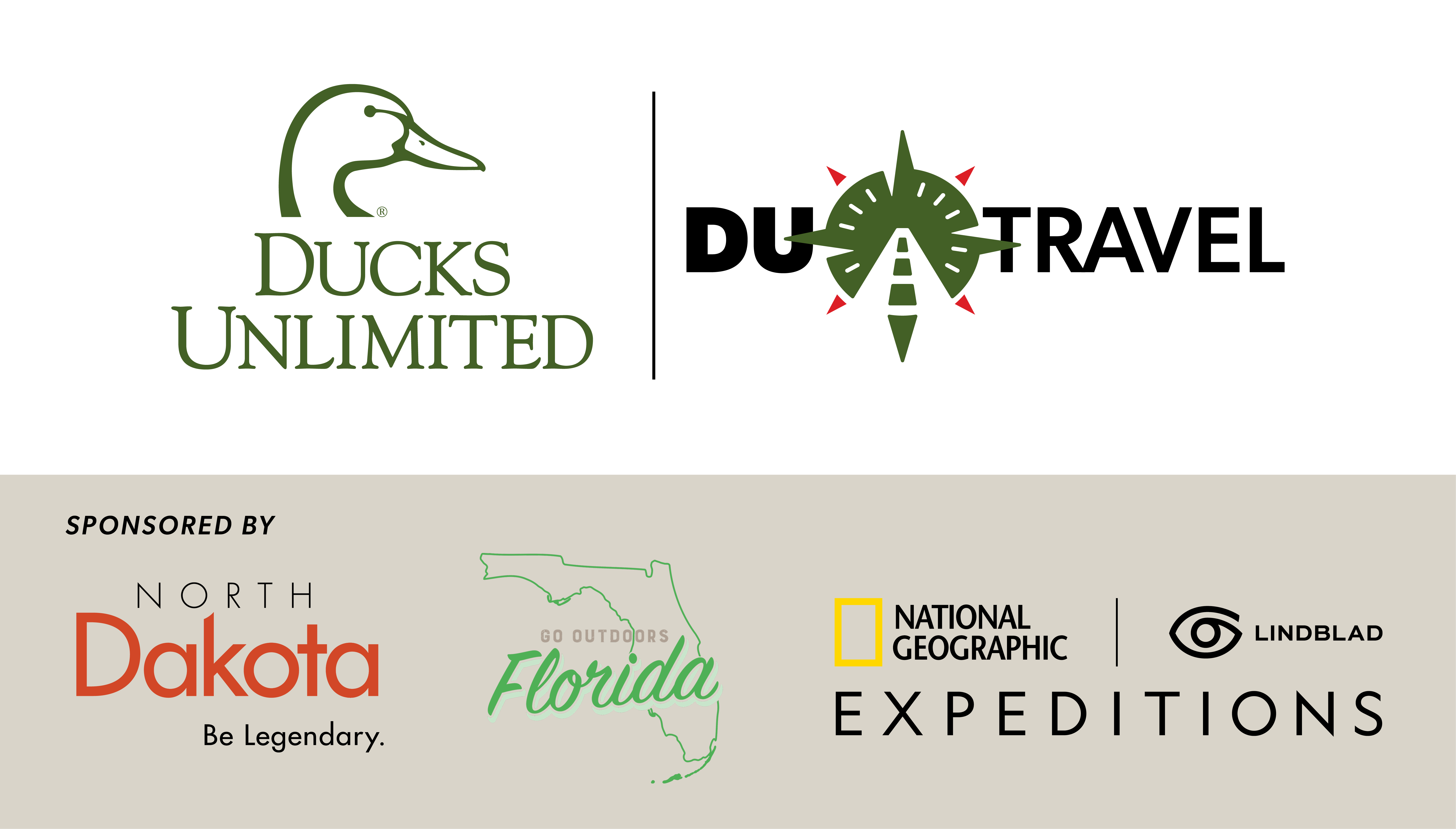
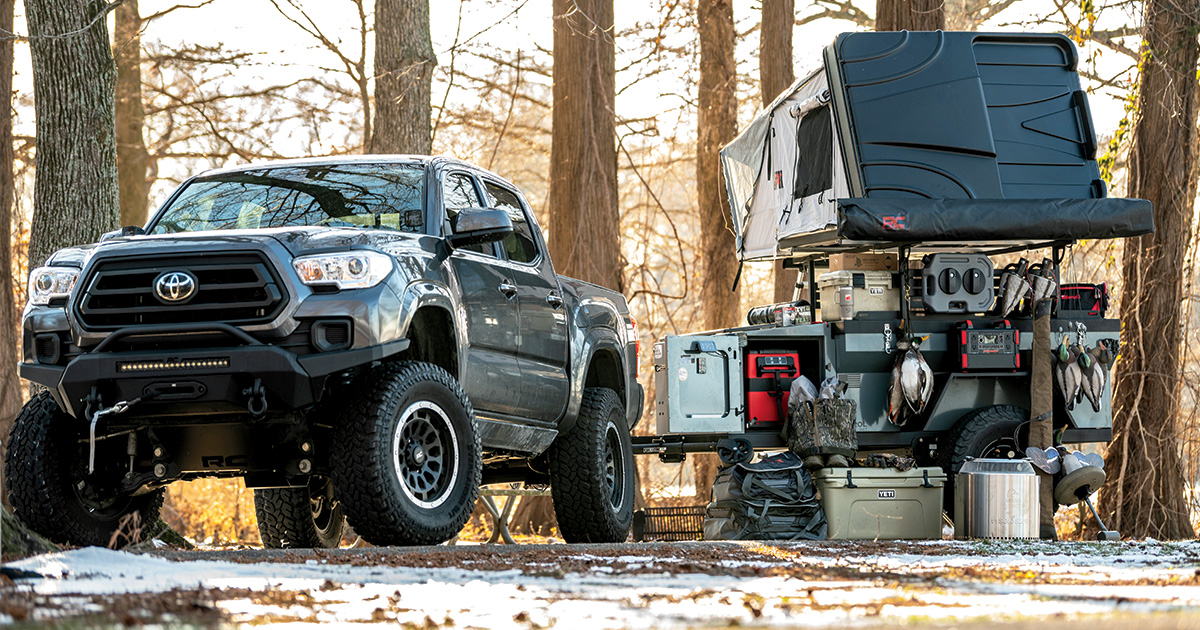
What hunter hasn’t dreamed about hitting the open road to chase ducks and geese moving up and down the flyways? It’s a wonderful dream, but without proper planning and gear, it’s a potential logistical nightmare. Weather, migration, hunting conditions, lodging, expenses, food—wayfaring waterfowlers should consider how these and other variables factor into their overall plans. Removing even one of these variables can help you stay focused on the birds. With a recreational vehicle, you can scratch lodging off the list of things you have to worry about. Instead of booking sketchy hotel rooms and bouncing from one city to the next, simply pack your gear in a duck camp on wheels and use it as a base for your waterfowl adventures—wherever they may take you.
Like the web-footed species we pursue, recreational vehicles come in all shapes and sizes, and they are available with features that will appeal to everyone from the minimalist weekender to the full-time road warrior. We talked to itinerant waterfowlers in various parts of the country to find out how they use travel trailers, RVs, and other types of vehicle-based camping equipment to set up shop in classic migration corridors.
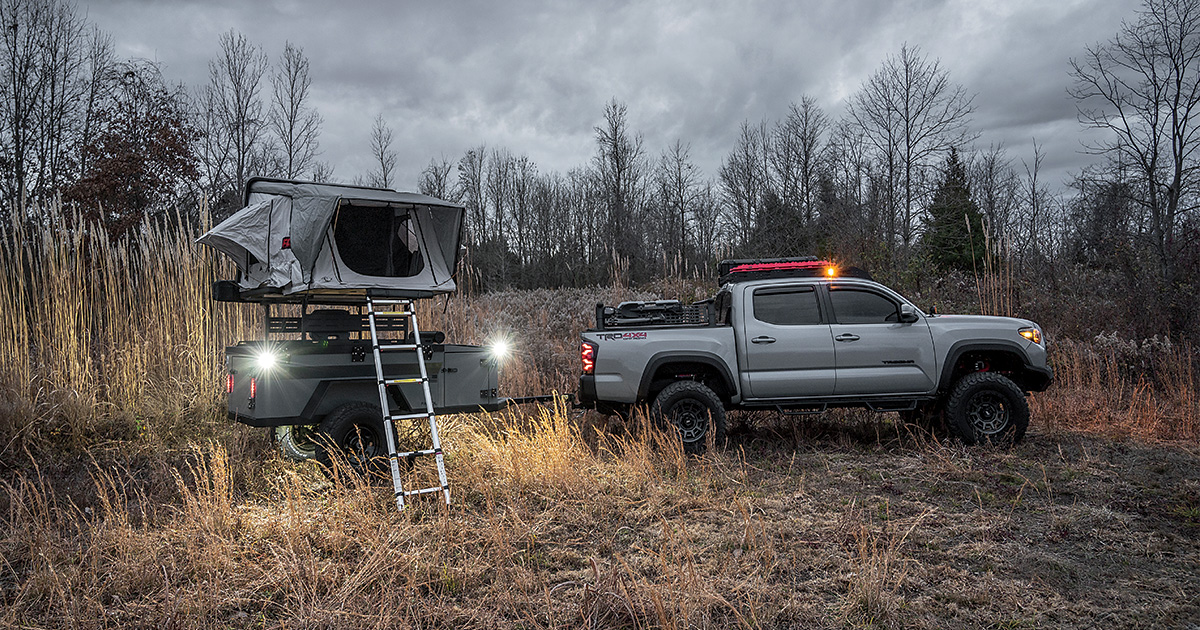
With features like off-road suspension and rugged tires, overlanding trailers are ready to go anywhere, from the backcountry to the local boat ramp.
West Tennessee is home to several key waterfowling hot spots. Hunters have quick access to the Mississippi River and renowned Reelfoot Lake, and they can even head across the river to chase birds in southeast Missouri or Arkansas. Camping options in the area are almost unlimited.
Seth Dortch, who handles marketing and development for Rough Country in Union City, Tennessee, takes an off-road approach to his camping rig, which he tows behind his 2021 Toyota Tacoma. His beefed-up trailer from Rustic Mountain Overland sports rugged tires, off-road suspension, and plenty of storage. It also has a clamshell-style pop-up tent with a hard top that is sturdy enough for transporting canoes, kayaks, or small boats.
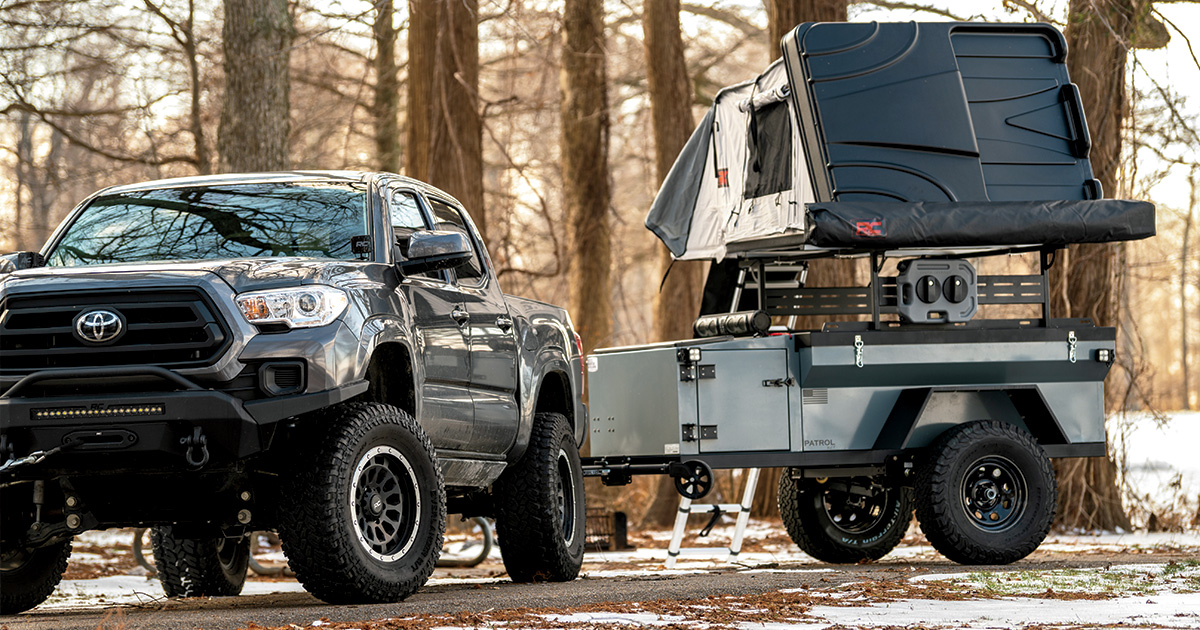
“Application of a setup like this is ideal for waterfowlers because the center of the trailer is wide open,” Dortch explains. “You can toss decoys, gear, and whatever else you need in that center section and still have room for other gear. This also works really well for big-game hunters. If you can find a boat ramp or somewhere to pop up the tent, that’s pretty convenient.”
Dortch mentions that this kind of rig is a great choice for hunters who aren’t looking to spend money on accessories for their truck—such as a truck tent. Instead, there are seemingly endless options for accessorizing the trailer itself. “I know guys who hunt out of these, and some of them are building their own—it’s a kind of a DIY approach with different accessories that fit their needs,” he says. “And when they need to go scout, they can just unhitch the trailer and leave their camping stuff set up.”
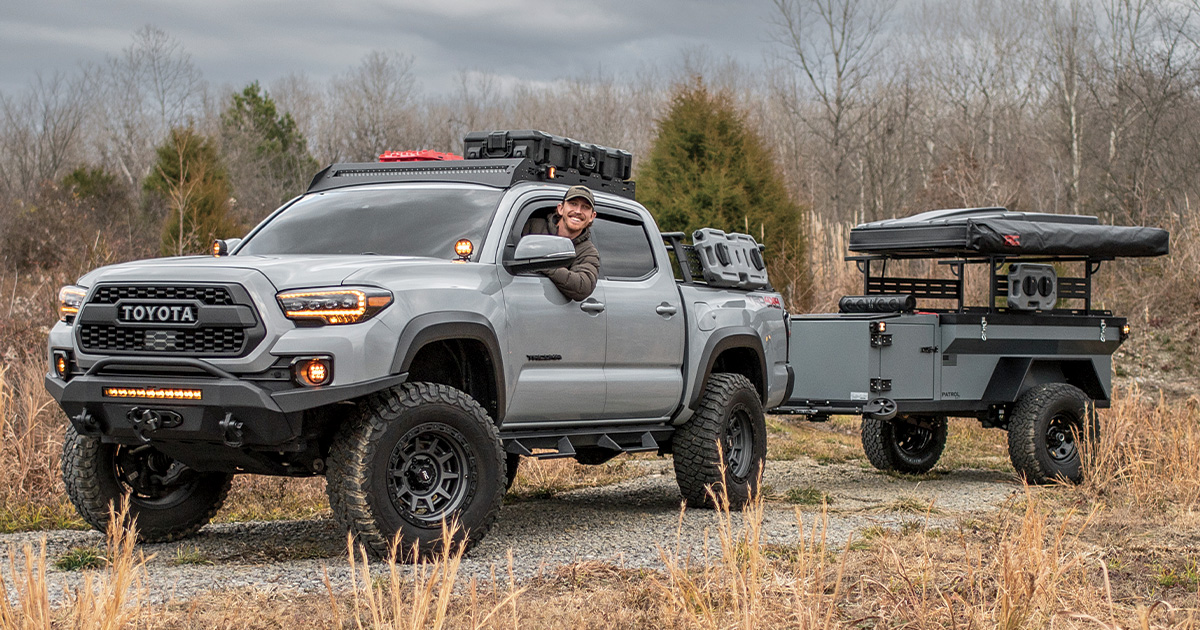
RVers who like to be self-reliant and travel to remote destinations are popularly known as “overlanders.” Their backcountry approach to outdoor adventures offers boundless possibilities for where you can stay, along with any accessories you may want to add. “This trailer is built for a rugged, backcountry approach,” Dortch says. “This is about true mobility.”
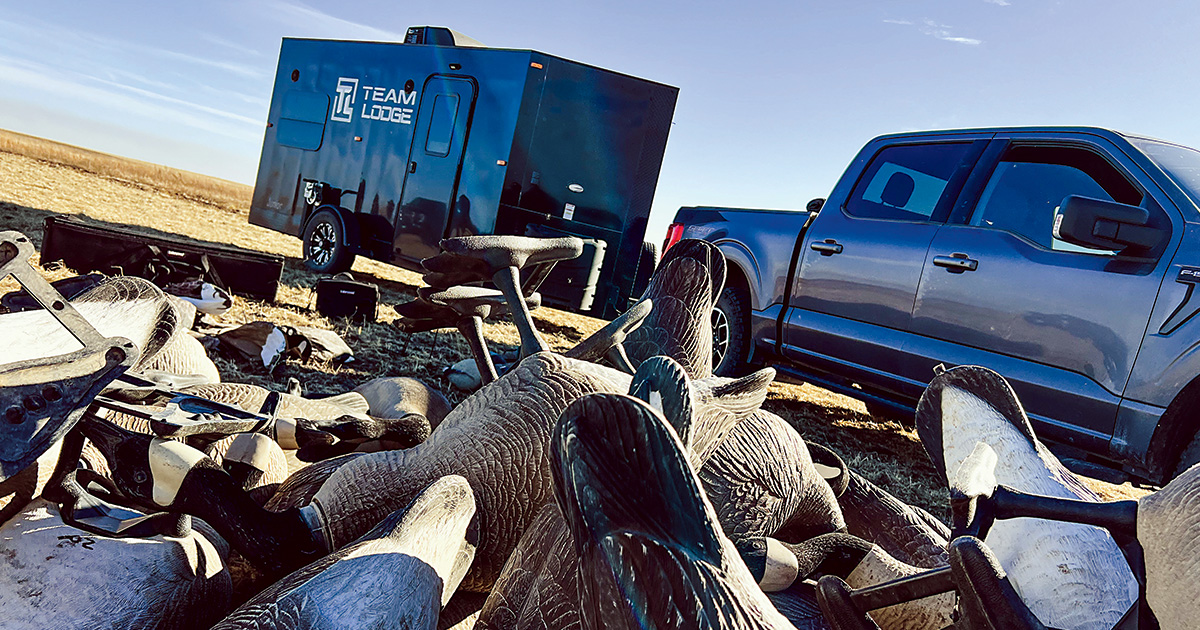
Originally designed for ice fishing, this trailer pulls double duty, hauling four-wheelers, decoys, and other waterfowling gear while also providing a comfortable living space.
Pat Kalmerton makes an annual pilgrimage from his home in Wisconsin to North Dakota to hunt ducks and geese. Kalmerton and his hunting partners used to stay in fish camps near Devils Lake, but this past year he added a Team Lodge Extreme 2 trailer to his arsenal, and it changed everything they did.
“We’ve always had trailers, due to the amount of gear we haul out here,” Kalmerton says. “When we brought the Team Lodge trailer, it served our needs of hauling large numbers of full bodies, four-wheelers, and other gear, as well as the ability to sleep in it. It was a game-changer. There are times when you don’t know where the birds are going to be, so you have to travel farther away from wherever you are staying.”
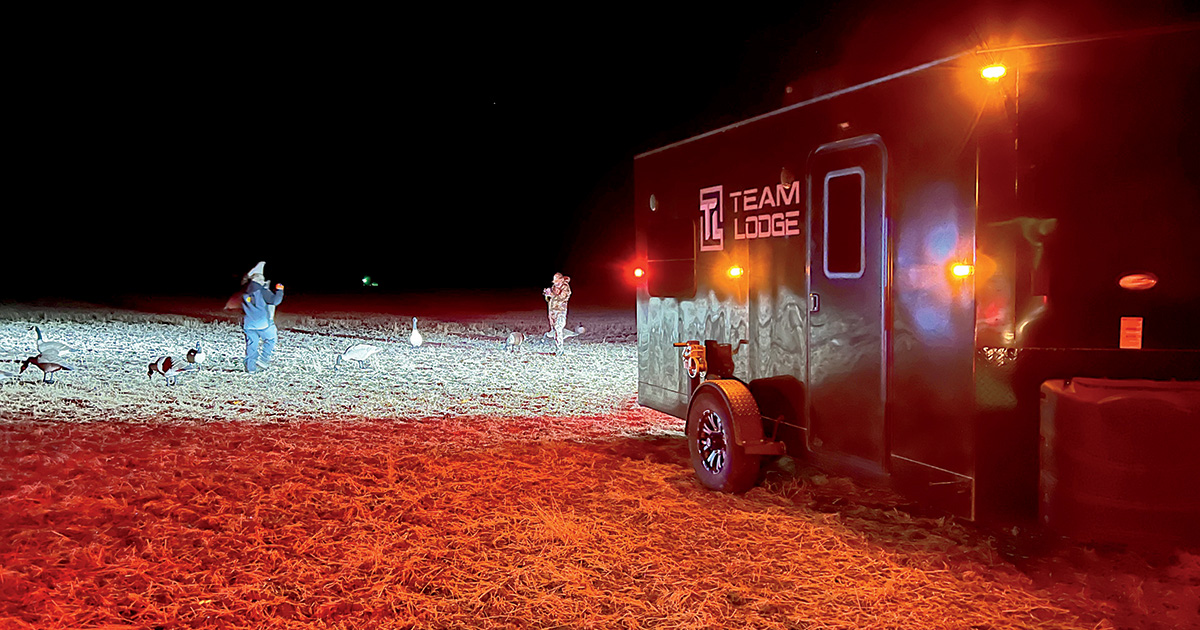
Team Lodge trailers were originally designed as ice-fishing trailers, and Kalmerton uses his for that purpose after winter pushes ducks and geese south. “It’s got everything you need as far as a bathroom, bunks, gas, and water,” he says. “And it is spacious enough for up to two four-wheelers and all our gear.”
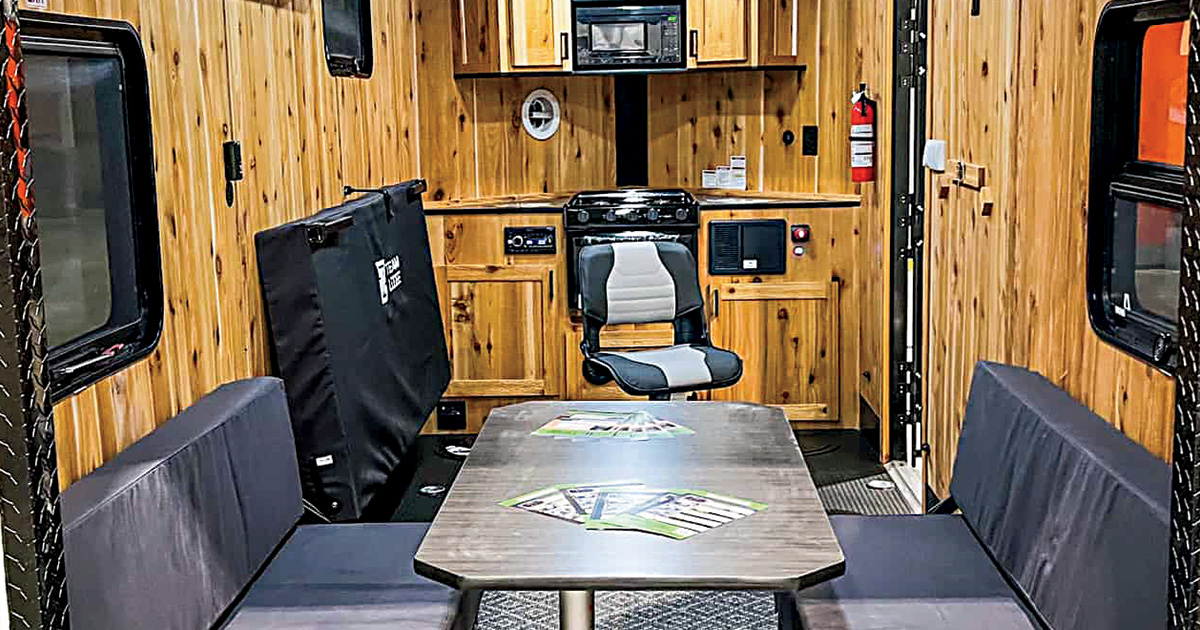
On their most recent waterfowling trip to the pothole country, Kalmerton says they found several large “feeds” (feeding concentrations) of Canada geese. After getting permission from the landowner, they unloaded their gear, dropped the trailer to the ground, and stayed in an open area near the field that the geese were using. They tossed out camp chairs, set up a grill, and watched birds pour into the roost for the night. “Listening to the geese go to bed and staying right there was a beautiful thing,” he adds. “We even had a freezer in the trailer, making processing birds so much more convenient. We will be taking the trailer on every trip now.”
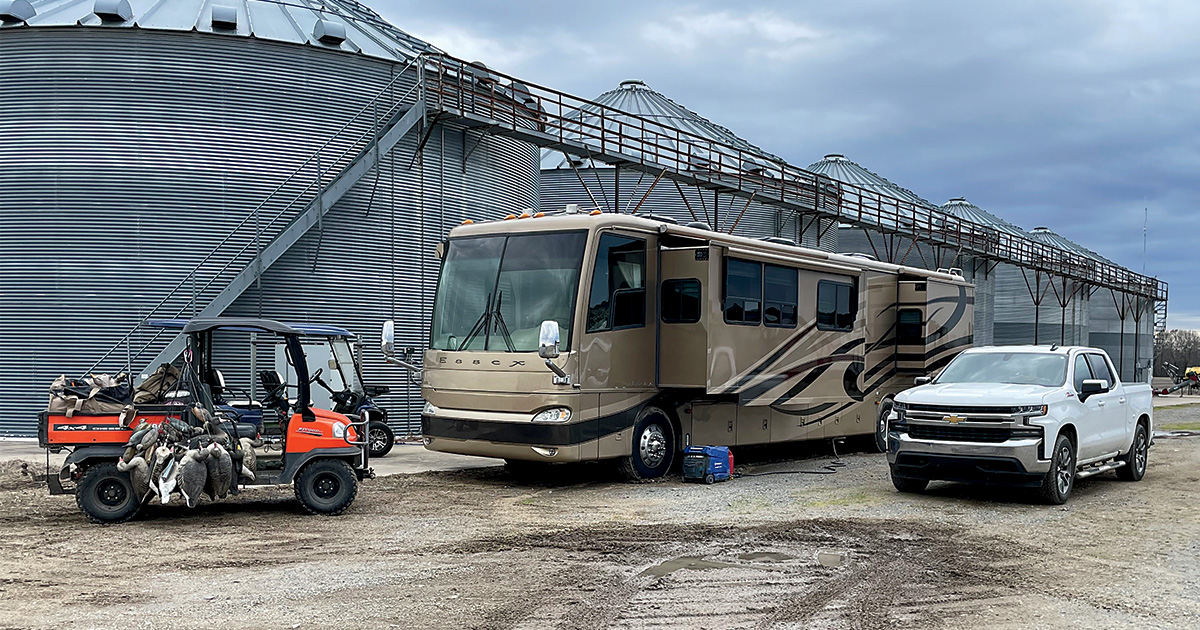
This luxurious duck camp can be set up in almost any location and is ready to head to the next waterfowling hot spot on a moment’s notice.
South Florida isn’t known as the heart of duck country. However, when Jay Sharpe, an avid waterfowler from Jupiter, Florida, wants to find ducks and geese, he loads up his 45-foot Newmar Essex motor coach with hunting gear and a couple of friends and hits the open road. Before traveling to hunting hot spots in Mississippi, Arkansas, Missouri, and Indiana, Sharpe converts his RV from a family vacation vehicle to the ultimate duck camp.
“It’s great to unload kids’ toys and things we’ve used all year and switch them out for waders, guns, blind bags, and ammunition,” he says. “There’s been a couple of years we’ve put 3,500 miles on the RV just traveling to chase ducks.”
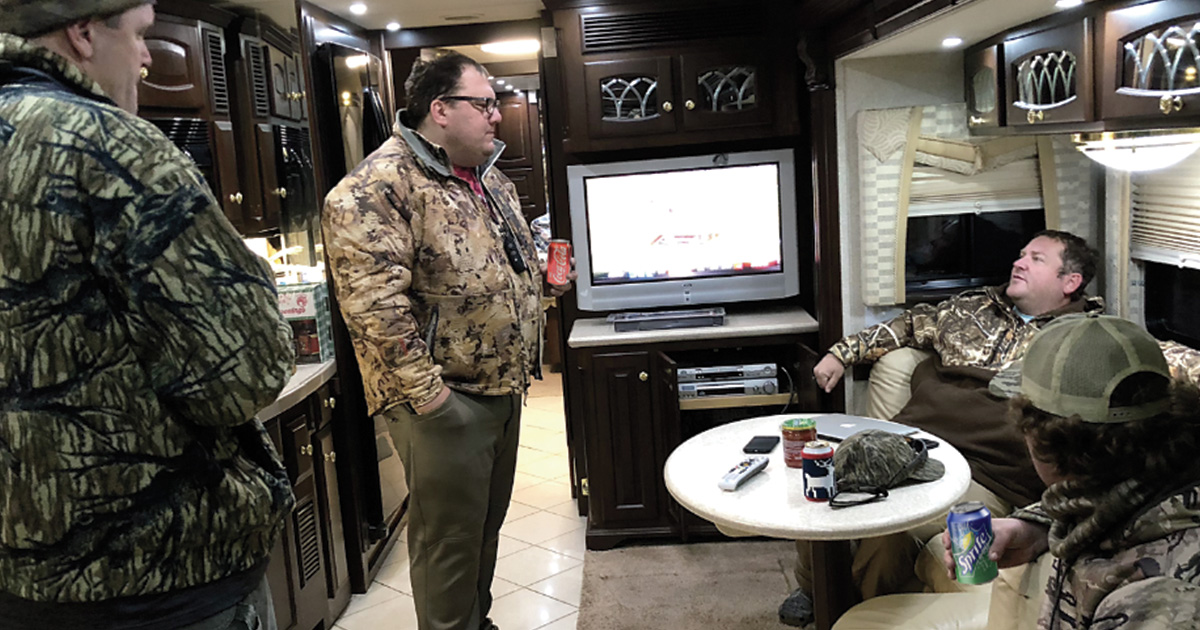
Sharpe is not roughing it in his rig. Because his RV is so big, he does sacrifice the ability to go some places, but finding a spot to park and set up in agricultural areas has never been a problem. “Nearly every farm has a big shop with a large gravel parking area. I just get permission to stay in one of those and I’m good,” he explains. “We’ve stayed in the casino lots in Tunica, Mississippi, and I’ve pulled it up next to grain bins in Arkansas. I typically pull a trailer with a vehicle, four-wheeler, or side-by-side too.”
This upscale approach is costly, but Sharpe appreciates the comfort and mobility it affords. “I’ve been hunting in Mississippi and gotten a phone call that a buddy has ducks in Arkansas, so I just pack up and hop across the river and stay for a couple of days,” he says. “I’ve even left Arkansas and traveled to Indiana to hunt with friends. Everything goes with me. And not having to worry about lodging or having the right gear is what makes this work.”
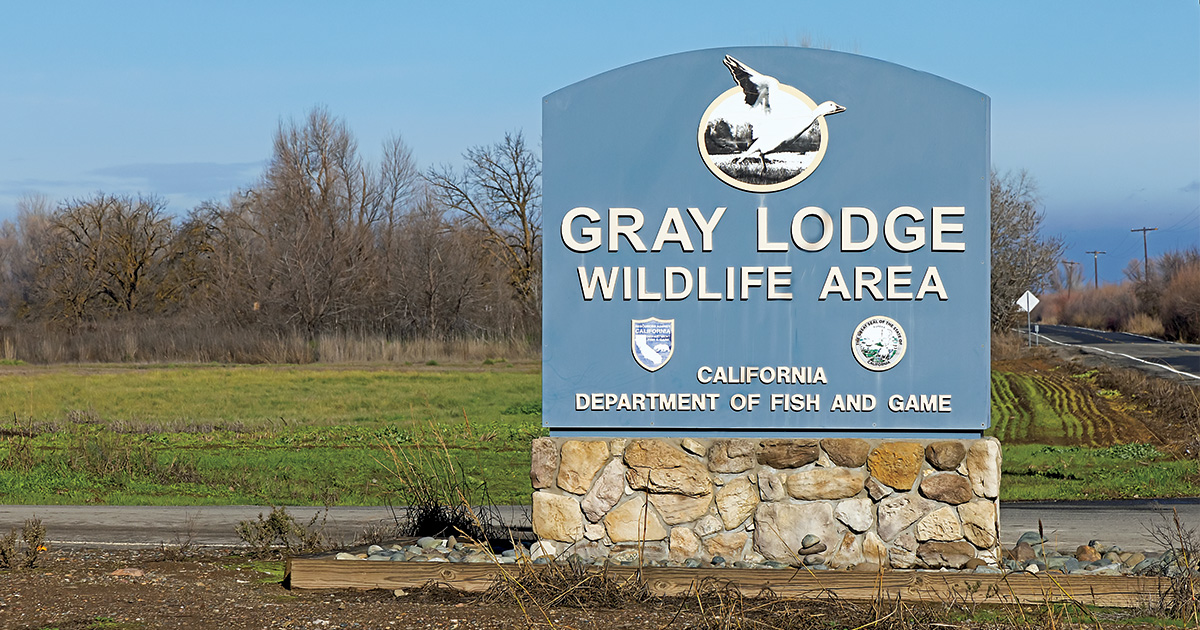
Gray Lodge Wildlife Area has to be one of the country’s top spots for RV waterfowlers. This 9,100-acre gem of a property in California’s Central Valley is a prime wintering area for waterfowl, and it offers hunting on Wednesday, Saturday, and Sunday throughout the season. What makes this a convenient spot for those who have an RV is that the property allows hunters to park their rigs overnight or even for the entire season.
“This is first-come, first-served for those looking to park a trailer, but it is pretty much unlimited because we never fill the entire lot,” explains Tim Hermansen, Gray Lodge property manager for the California Department of Fish and Wildlife. “There are no utilities provided—water or electricity—but we do allow generators.”
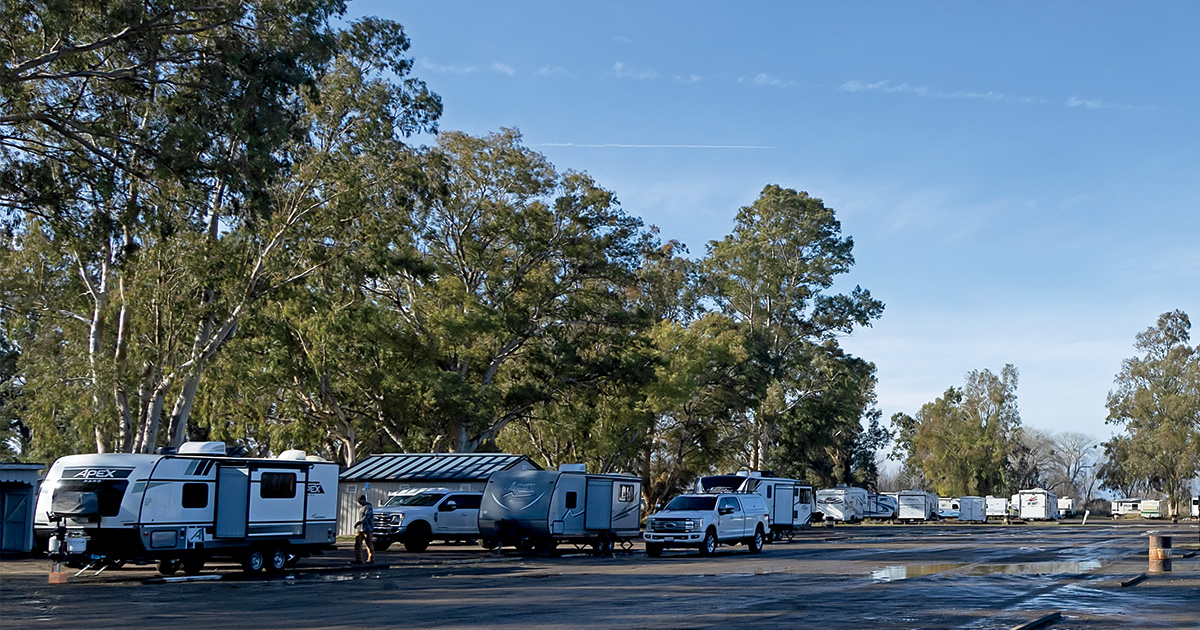
There’s space for dozens of RVs at Gray Lodge Wildlife Area, where hunters can stay close to the waterfowling action.
Many hunters take advantage of Gray Lodge’s reservation system. Make a reservation in advance and you’re guaranteed a spot to hunt on a particular day. Hunters without reservations can try their luck in the “sweat line,” where they have the opportunity to fill vacancies created by hunters who didn’t show up for their reservation.
“If you have a reservation, you can sleep in a little longer before you get up to hunt,” Hermansen explains. “It saves a lot of traveling back and forth from wherever these hunters live. The sweat line guys need to be there early and get in line.”
Hermansen, who has managed the property for more than three years, says that the hunting at Gray Lodge can be pretty good, and that’s what draws upward of 60 to 70 trailers at a time. “Some guys do keep their trailers here and hunt some of the other state-managed properties in the area,” he says. “There are also some hunters who dedicate their entire hunting effort just to Gray Lodge, which makes having a trailer on the property very convenient.”
All RVs at Gray Lodge must be fully registered and owned by a licensed hunter. Those staying long-term need to register with the main office. For more information, visit wildlife.ca.gov/Lands/Places-to-Visit/Gray-Lodge-WA.
Ducks Unlimited uses cookies to enhance your browsing experience, optimize site functionality, analyze traffic, and deliver personalized advertising through third parties. By continuing to use this site, you agree to our use of cookies. View Privacy Policy